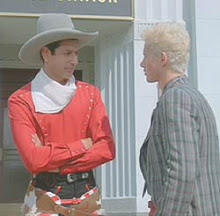
21. JUDY COLLINS, "Both Sides Now"
Produced by Mark Abramson; written by Joni Mitchell
Elektra 45639 1968 Billboard # 8
22. HOLE, "Clouds"
Produced by Kim Gordon and Don Fleming; written by Joni Mitchell
1991 Did not make pop charts
23. JONI MITCHELL, "Both Sides Now"
Produced by Paul Rothchild; written by Joni Mitchell
1969 Did not make pop charts
Behold the Vinegar Tasters! The illustration above is supposed to be an allegorical representation of three major Asian philosophies, with the three men around the barrel of vinegar meant to represent (from left to right) Confucius, Buddha, and Lao-Tse. The copy I've put up of the woodcut in question is pretty murky, but I'm told you're supposed to read their facial expressions as sour, bitter, and smiling in that order, indicating the affective bent of their views on the pain of earthly existence.
If we made a similar triptych of Joni Mitchell, Courtney Love, and Judy Collins gathered around this song,
 their expressions would not exactly match those of Confucius, Buddha, and Lao-Tse, but there would be a certain correspondence. Collins' version remains, I think, the most widely known and by far the sunniest interpretation of the song. Even if you could somehow remove that Mitch Milleresque glockenspiel from the arrangement, Collins still seems to grant only lip service in her performance to the downside of life. She may say that she recalls life's illusions, but she seems to be embracing them too. Collins, like Lao-Tse, seems to believe that even the vinegar of life is part of the natural order.
their expressions would not exactly match those of Confucius, Buddha, and Lao-Tse, but there would be a certain correspondence. Collins' version remains, I think, the most widely known and by far the sunniest interpretation of the song. Even if you could somehow remove that Mitch Milleresque glockenspiel from the arrangement, Collins still seems to grant only lip service in her performance to the downside of life. She may say that she recalls life's illusions, but she seems to be embracing them too. Collins, like Lao-Tse, seems to believe that even the vinegar of life is part of the natural order.Courtney Love and the rest of Hole, however, seem to be the Buddhists in this interpretative picture.
 In Love's defense, she was allegedly forced by her hippie parents to sing this song repeatedly at the dinner table growing up, and that's enough to drive anyone to make a dirge out of even the most innocuous tune. But if Collins seems inclined to stress the Win side of life, Hole seems equally as inclined to stress the Lose side of the equation. Something's gained for Collins in living every day, but much more is lost for the members of Hole. Like Buddha, Love and her friends seem inclined to find life to be a world of dust, pain, and illusion. (And after all, wasn't it Buddha who taught his followers to seek Nirvana?)
In Love's defense, she was allegedly forced by her hippie parents to sing this song repeatedly at the dinner table growing up, and that's enough to drive anyone to make a dirge out of even the most innocuous tune. But if Collins seems inclined to stress the Win side of life, Hole seems equally as inclined to stress the Lose side of the equation. Something's gained for Collins in living every day, but much more is lost for the members of Hole. Like Buddha, Love and her friends seem inclined to find life to be a world of dust, pain, and illusion. (And after all, wasn't it Buddha who taught his followers to seek Nirvana?)And then there's Joni, who actually wrote the song, of course, and who serves as the Confucius of this philosophical hootenanny. Her accompaniment for the song is so simple that one probably doesn't notice it. It's just an acoustic guitar--"just," as if an experienced guitarist can't make her instrument speak with dozens of different voices and intents. Both Collins and Hole pile on the instruments in their arrangements, pile on the noise, to support willful sunniness or cloudiness as their temperaments lead them. Mitchell, though, just strums with a pick, adding a little figure at the end of each refrain that grows more tentative with each verse. And her strumming hits the downbeat so hard each time in most measures that one could easily interpret it as the other shoe of fate dropping, no matter what the singer thinks or plans. As far as her vocal is concerned, she's not angry the way Love is, nor is she bravely facing the deluge the way Collins may be. She just seems . . . resigned.

So who's the optimist in this picture? Who's the nihilist? Who's the realist? Like almost everything else in this life, it's open to interpretation.

No comments:
Post a Comment